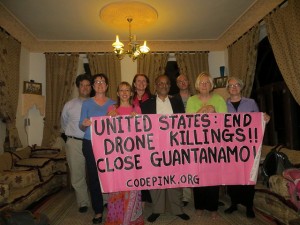
Drone summit Nov 2013
Faisal bin Ali Gaber is a soft-spoken engineer from Yemen. After he lost his cousin and brother-in-law in a drone strike in August 2012, he published an open letter to President Obama and Yemeni President Hadi. He said his brother-in-law was an imam who had strongly and publicly opposed al-Qaeda, and that his young cousin was a policeman. “Our town was no battlefield. We had no warning. Our local police were never asked to make any arrest,” he wrote to the presidents. “Your silence in the face of these injustices only makes matters worse. If the strike was a mistake, the family — like all wrongly bereaved families of this secret air war — deserve a formal apology.”
Now Faisal Gaber will get a chance to appeal directly to the American people. This weekend for the first time ever, a Yemeni delegation of drone strike victims’ family members, human rights experts and grassroots leaders will be visiting Washington as part of the Global Drone Summit–– You can watch the Summit live all weekend on the CODEPINK livestream channel.
While the CIA and US military have been using lethal drones for over a decade, this will be only the second time that drone victims have gotten visas to come to the United States to tell their stories. The first visit was just a few weeks ago when, on October 29, the Rehman family — a father with his two children — came all the way from the Pakistani tribal territory of North Waziristan to the US Capitol to tell the heart-wrenching story of the death of the children’s beloved 67-year-old grandmother. The hearing, convened by Congressman Alan Grayson, had the congressman, the translator and the public in tears. The Rehman family’s story is documented in the new film Unmanned: America’s Drone Wars by Robert Greenwald of Brave New Foundation, which was released at the time of their visit.
Just as the visit and the film have put real faces on drone victims, new reports by prestigious institutions have brought the covert drone wars out of the shadows. Amnesty International issued a report on drone strikes in Pakistan. Human Rights Watch issued a report on the civilian cost of US targeted killings in Yemen, the new focal point of the US drone wars. Also just released are two UN reports: one by Christof Heyns, the UN’s special rapporteur on extrajudicial, summary or arbitrary executions, and the other is by Ben Emmerson, the special rapporteur on human rights and counter-terrorism. Both question the US legal framework in light of international law and decry the lack of transparency and accountability. The UN reports engendered the first-ever UN discussion on remote-controlled killing at the General Assembly when, on October 26, representatives from a broad swath of nations took turns denouncing US drone policies.
The US government is feeling the pressure. It has taken steps to reduce civilian casualties and has reduced the actual number of strikes, but certainly not eliminated them. In fact, there was a drone strike in Somalia on October 28, one in Pakistan on October 31, and yet another one in Yemen on November 7.
While the reduction in the number of strikes is a partial victory, it cannot erase the hundreds of innocent lives lost over the years. Also, with the global proliferation of drones (thanks to the easing of restrictions on overseas sales and the introduction of domestic drones into US skies by September 2015), their usage will inevitably increase.
That’s why the Global Drone Summit on November 16-17 will bring together hundreds of people from across the US and around the world to discuss strategies to stop the proliferation of drones used for killing and spying. It is organized by the peace group CODEPINK, along with the Institute for Policy Studies, The NationMagazine, Center for Constitutional Rights, and the National Lawyers Guild.
In addition to the Yemeni delegation, the Summit will include drone pilots, legal experts, human rights advocates, authors, technology experts, artists and grassroots activists. Their hope is to build a global movement to rein in the use of drones for the purposes of killing and spying. With the FAA mandated to open up US airspace to drones by 2015, and police departments around the country anxious to purchase drones with Homeland Security grants, the issue of drones for domestic surveillance is of grave concern to civil liberty and privacy activists.
It seems that the more Americans know about the effects of killer drones, the less likely they are to support them. Polls show a precipitous decline in support from 83 percent in 2012 to 61 percentone year later. Hearing directly from the victims will continue to erode the support.
As Predator drones are forced out into the light of day, the veneer about their pinpoint precision and effectiveness in fighting terrorism is being peeled away. What gets exposed is the innocent lives destroyed and the blowback that keeps us in a state of perpetual war.
 TAKE ACTION!
TAKE ACTION!
You can watch video of the Drone Summit that live streamed over the weekend


